#Dioscorides
Explore tagged Tumblr posts
Text

Εκμαίνει χείλη με ῥοδόχροα, ποικιλόμυθα, ψυχοτακ
Dioscorides
I am driven mad by those rose-red, discursive, soul-melting lips…
73 notes
·
View notes
Text
Crime & Christie: Seven Degrees of Separation
Just some of the Christie mysteries containing arsenic! Fun Fact: Did you know Agatha Christie used arsenic as a murder weapon, misled investigators with, or referenced the chemical element in nearly 25% of her mysteries? True story! However, ages before Agatha Christie earned the moniker ‘Queen of Poisons’ for her application of arsenic (and other equally baneful substances) within her books,…

View On WordPress
#agatha Christie#arsenic#arsenic poisoning#chicago#De Materia Medica#Dioscorides#Hippocrates#James marsh#Johann metzger#klanck#marsh test#my 52 weeks with christie#mystery#nero#orfila#poisoning#Saint Albertus Magnus#scheele#vulcan
4 notes
·
View notes
Text

Dioscorides and a companion collecting plants in bags, 1v

Dioscorides and Galen, 4v
Herbal in the tradition of Dioscorides, Manuscripts Oversize LJS 62
#manuscript#medieval#medieval art#middle ages#medieval manuscripts#medieval history#illuminated manuscript#illumination#herbal#dioscorides#plants
5 notes
·
View notes
Text
I found out in the Dioscorides that parsley has sulfur as one of its mineral components... And it's traditionally used for hex-breaking where I live... I've had that little greeny in front of me the whole time and never thought about working with it... Behold parsley ���
#witchblr#witchcraft#broom closet witch#spoonie witch#budget witchcraft#spellcraft#spellwork#magick#natural magic#magic#folk witchcraft#folk magic#hex-breaking#parsley#dioscorides#sulfur
22 notes
·
View notes
Photo
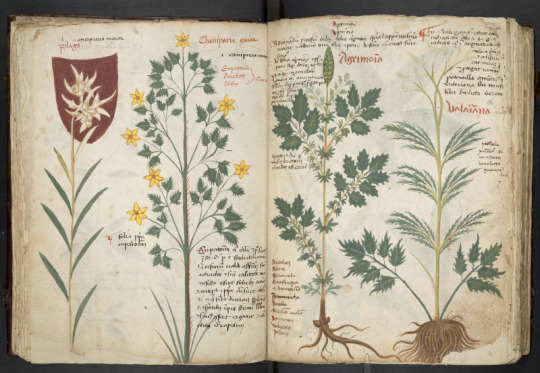
Este manuscrito, conocido como el Códice Bellunensis, es una adaptación de un antiguo trabajo del griego Dioscorides, De Materia Medica, pero también incluye observaciones sobre la flora local de los Dolomitas.
#books#libros#manuscript#manuscrito#bellunensis#dioscorides#de materia medica#dolomitas#italia#italy#XV
14 notes
·
View notes
Text
Language of Flowers: Rose Campion
In the language of flowers, the flower for today, October 20, is Rose Campion, which signifies gentleness. Image from Wikipedia. Silene coronaria, still sometimes called Lychnis coronaria in the UK, is a short-lived perennial of the pinks family that originally came from southwestern Europe but has been so long grown in gardens it is found in most temperate climates around the world. Image…
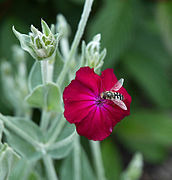
View On WordPress
#birthday#coronaria#De Materia medica#Dioscorides#herbalism#Language of flowers#lychnis coronaria#lychnos#october#pinks#Rose Campion#scorpion bites#silene coronaria
1 note
·
View note
Text
Tilting at Windmills with Don Quixote, Or, A Meditation on Spanish Herbals
Illustration by Octavio Ocampo I’ll confess something here: until just recently, I never read Don Quixote, except for snippets here and there. No, thanks to the preferences of my Spanish professors, instead I spent days swooning over the lyricism of poets Federico García Lorca and Pablo Neruda or stumbling through conquistador Bernal Díaz del Castillo’s account of Hernando Cortés’s conquest of…
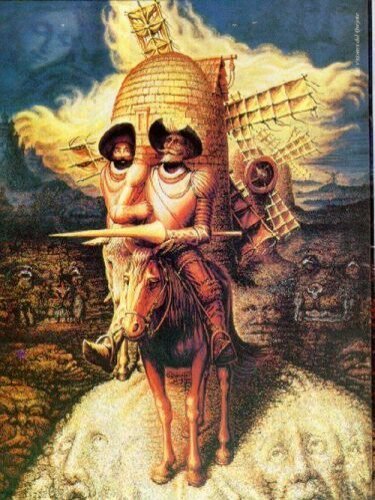
View On WordPress
#acerca de la material medicinal#Andrés de Laguna#Arnald of Villanova#Bernal Díaz del Castillo#Don Quixote#Federico García Lorca#Libro de Medicina llamado Macer#Longaniza#Luis Lobera de Ávila#Macer Floridus#Melitta Weiss Adamson#Miguel de cervantes#Nicolás de Monardes#Odo of Meung#Pablo Neruda#Pedacio Dioscorides Anarzabeo#Penelope Casas#Rafael Chabrán#Rosemary#Sancho Panza
1 note
·
View note
Photo
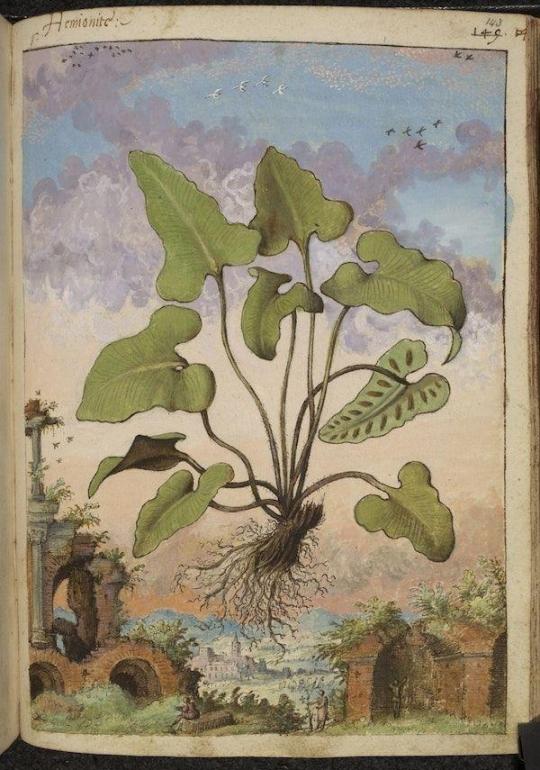
One of many wonderful full-page watercolour illustrations in a 16th-century edition of Pedanius Dioscorides’s work on herbal medicine, De Materia Medica (ca. 80 AD). More here: https://publicdomainreview.org/collection/watercolours-from-a-16th-century-de-materia-medica
333 notes
·
View notes
Text
i quite like how the only remnant of dacian is the catalogue of dacian names for medicinal herbs recorded in the various mediaeval copies of dioscorides' de materia medica. we'll never know the dacian words for love or strife, but we do know under what names they knew sweet chamomile and black hellebore..
27 notes
·
View notes
Text
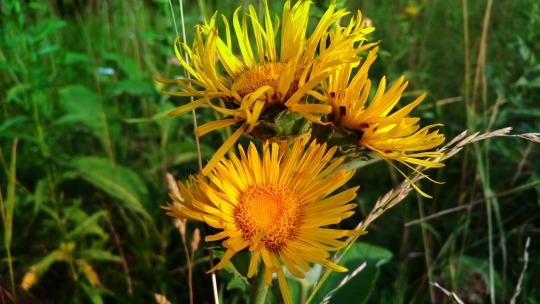
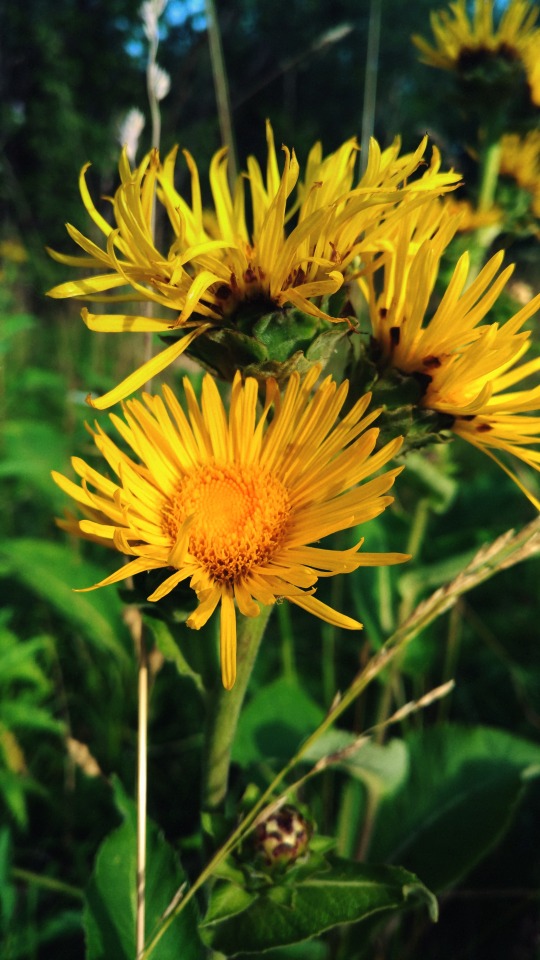
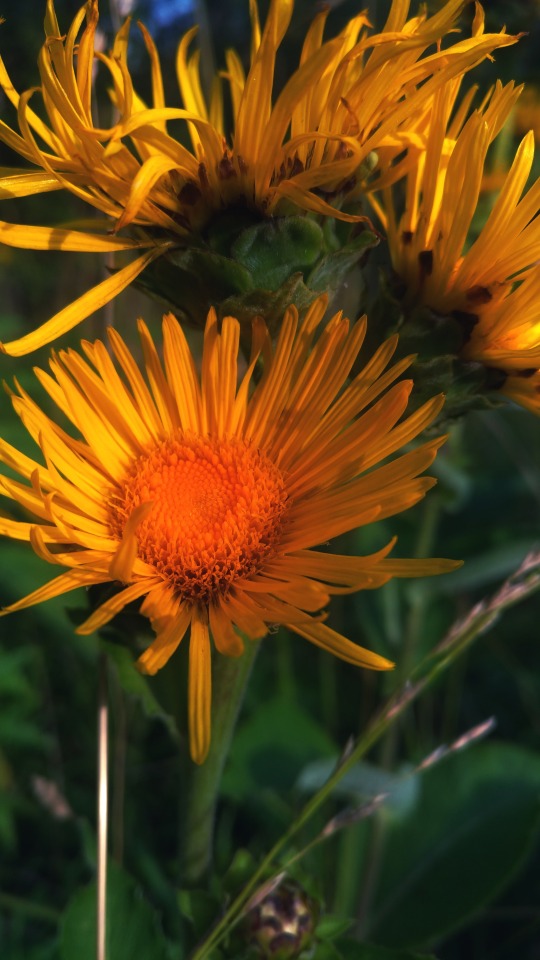
Девясил высокий (лат. Ínula helénium) — вид многолетних растений рода Девясил (Inula) семейства Астровые (Asteraceae). Он относится к древним лекарственным растениям, которые применяли врачи эпохи Гиппократа, Диоскорида, Плиния. Растение использовалось в практике Авиценны.
Elecampane (lat. Ínula helénium) is a species of perennial plant of the genus Inula (Inula) of the Asteraceae family. It belongs to the ancient medicinal plants that were used by doctors of the era of Hippocrates, Dioscorides, and Pliny. The plant was used in the practice of Avicenna.
#русский tumblr#россия#природа#зеленая природа#загородом#цветущие травы#желтые цветы#девясил#мои фото#макрофото#russia#nature photography#outdoors#beauty of nature#flowering herbs#yellow flowers#Elecampane#my photos#original photography#photographers on tumblr#macro photography
222 notes
·
View notes
Text
Narrations about psychotropic plant usage and intoxication from ancient writers like Theophrastus, Pliny, Dioscorides, Athenaeus, and Plutarch reveal that drugs were used in different recreational settings.
These authors tell stories of wild parties lasting all day, multiday parties, deadly drinking contests, and the use of funnels to accelerate drinking. There are stories about people using psychotropics for artistic and intellectual inspiration. Some people were famous for using substances all day as a lifestyle choice. There are scenes where shepherds are hanging around the drug dealers in the markets having contests of drug usage. There were taverns, inns, and wine bars, where people consumed wine and psychotropic substances at all hours. Extracts and raw materials of psychoactive plants were available for sale at the open markets of the ancient world. Drug dealers sold the items and gave advice about using them. Drugs often contained multiple ingredients and were adulterated. Some items, like frankincense and myrrh, were imported to Greece and Rome through trade routes.
-- Alan Sumler, Intoxication in the Ancient Greek and Roman World
34 notes
·
View notes
Text






Book 536
Herbal
Joseph Wood Krutch
David R. Godine 1976
This oversized paperback is kind of an odd duck. A kind of compendium of herbal lore, science, and art, this book presents a list of 100 plants and six animals along with some random facts, history, science, philosophy, and even humor. Each entry is accompanied by an illustration taken from the 16th century folio, Commentaries on the Six Books of Dioscorides, by Pierandrea Mattioli. The illustrations are generally attributed to Giorgio Liberale and Wolfgang Meyerpeck, but there seems to be a bit of dissent regarding that. Whoever made them, they are lovely and mostly the reason why I bought the book. Originally published in 1965, this 1976 paperback is printed on two different colors of paper. It’s a wonderful effect, and it’s a shame more books aren’t printed this way anymore.
#bookshelf#personal collection#personal library#books#library#bibliophile#book lover#illustrated book#booklr#herbal#joseph wood crutch#botanical illustration#natural history#david r godine
15 notes
·
View notes
Text
Tips for magical ink 🖋️
Wormwood allegedly possesses the magic power to provide protection for the written word from all sorts of dangers spiritual and magical as well as the verminous kind with little teeth. Dioscorides recommended adding wormwood juice to ink in order to keep mice away from papyrus.
#baby witch#book of shadows#cottagecore#divination#green witch#magick#tarot#wicca#witch aesthetic#witch tips#witchyvibes#witchlife#witchcore#witch spells#witches#witch#witchcraft#witch community#witchblr#witchythings#pagan witch#spiritual cleansing#spellbound#spell jar#spellcraft#spellwork#spellcasting#spells#spell#spellbinding
36 notes
·
View notes
Text
Manuscript Monday: LJS 447 - [Masālik al-abṣār fī mamālik al-amṣār]. (Video Orientation)
Dot Porter, SIMS Curator of Digital Humanities, presents a Video Orientation to the University of Pennsylvania Library’s LJS 447, descriptions and illustrations of domestic and wild animals, birds, insects, marine animals, plants, stemless plants, and herbs. Sources include Dioscorides, Galen, and Ibn al-Bayṭār. The larger, encyclopedic work of which the text of this manuscript is a part, also…
21 notes
·
View notes
Text
Herbalism 101: Mullein Leaf
Fun fact: Mullein is a member of the Snap Dragon Family.

The Mullein plant has been around for years and has more than 200 species. The most popular type is common mullein (Verbascum Thapsus.) the leaves harvested near the bottom of the plant and used either dried or fresh.
Mullein flowers and leaves were used on animals and people for a variety of issues:
Cough
Congestion
Bronchitis
Asthma
Constipation
Pain
Inflammation
Migraine
Sleep
Gout
By the late 1800s, mullein became a popular treatment for people with tuberculosis in Europe, the United States, and the United Kingdom. Keep in mind that many of the benefits of mullein are based on anecdotal experiences. More human clinical studies are needed to understand the benefits of this herb. -Healthline
Mullein leaf is sold in various forms:
Tea
Extract
Oil
Powder
Capsule
Elixir
Some can be made into creams.
Some herbalists recommend mullein for respiratory and inflammatory conditions, but there is not enough scientific evidence of its effectiveness. -Healthline
Dioscorides, a Greek physician pharmacologist and botanist, practicing in the 1st century in Rome, who authored the herbal De Materia Medica, was one of the first to recommend mulleins use in lung conditions around 2,000 years ago. It was used as a hair wash in ancient Roman times; the leaf ash to darken hair, and the yellow flowers for lightening it. The leaves were dried, rolled and used as wicks for candles and the entire dried flowering stalks were dipped in tallow and used for torches, hence the names 'candlewick plant' or 'torches'. According to Maida Silverman in her book A City Herbal, " The great respect and love formerly accorded to mullein can be inferred from the number and variety of the folk names for it." -Mountain Rose herbs.
Mullein leaf, flower, and root, with its litany of folk uses ranging from 'nature's toilet paper' to an effective apotropaic (fancy word meaning that which wards off evil spirits), have been used extensively in folk medicine. Its magical qualities were numerous, going beyond simply warding off evil but also was thought to instill courage and health, provide protection, and to attract love. In fact, it was believed that wearing mullein would ensure fertility and keep potentially dangerous animals at bay while trekking along in the wilderness. Further, allegedly a practice for men in the Ozark mountains to attract love consisted of simply pointing the mullein's flowering stalk towards the direction of his love's house and seeing if the stalk went upright again indicating her reciprocated love. Mullein, like so many herbs of European origin, was introduced by the colonists and then incorporated into the Native American healing tradition. The root was made into a necklace for teething infants by the Abnaki tribe, the Cherokee applied the leaves as a poultice for cuts and swollen glands, and other tribes rubbed the leaves on the body during ritual sweat bathes. Additionally, the flowers were used internally as teas and topically as poultices. The Navajos smoked mullein, referring to it as "big tobacco" and the Amish were known to partake as well. Presently, mullein can be found at health food stores often prepared as soothing leaf tea or an ear oil made of the infused flowers. -mountainroseherbs
According to King's American dispensatory (a book first published in 1854 that covers the uses of herbs used in American medical practice), "upon the upper portion of the respiratory tract its influence is pronounced." Mullein was prescribed by Eclectic Physicians (a branch of American medicine popular in the 1800-early 1900's which made use of botanical remedies) who considered it to be an effective demulcent and diuretic, and a mild nervine "favoring sleep." -Mountain Rose herbs.
DISCLAIMER: Precautions Small hairs on mullein leaf may cause mechanical irritation in the mouth and throat if not filtered out of extracts prior to consumption. We recommend that you consult with a qualified healthcare practitioner before using herbal products, particularly if you are pregnant, nursing, or on any medications.
#hearth witch#kitchen witch#pagan#witch blog#herbal magick#herbs#witch#kitchen witchery#witchcraft#green witch#witchy#pagan witch#witch aesthetic#witches#witchyvibes#baby witch#cottage witch#earth witch#forest witch#hedge witch#lunar witch#nature witch#witch community#witch familiars#kitchen witchcraft#witch core#witch history#witch tips#witchblr#witchcore
134 notes
·
View notes
Text
Flowers of Mythology - Narcissus
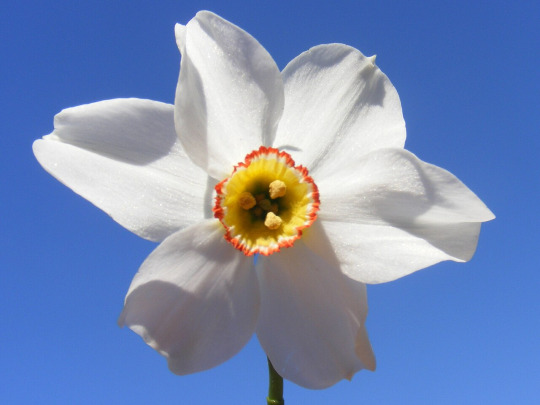
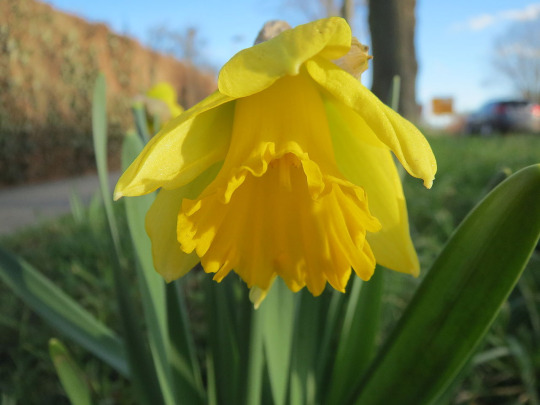
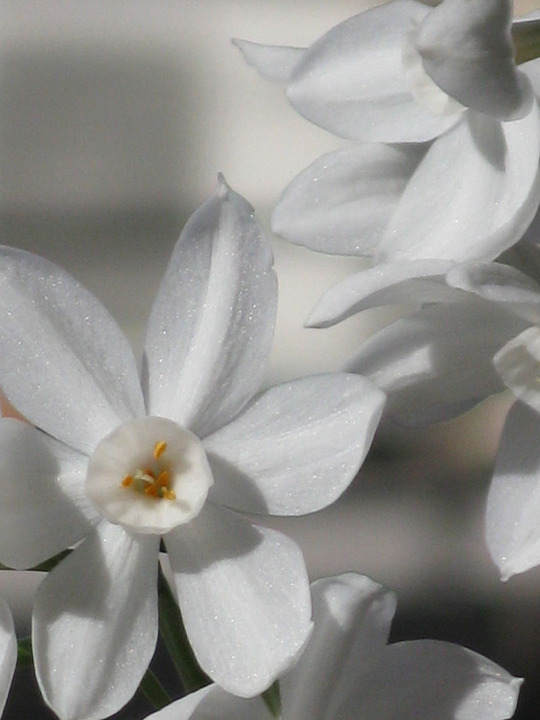
Narcissus is a genus of plants that include daffodil and jonquil as well as narcissus. They are spring flowering perennial plants that have obvious flowers with six outer petals and a cup- or trumpet-shaped crown. These can be white or yellow and both the outer petals and crown can be the same or opposite colors. Garden varieties, which are specifically bred for other colors, can come in orange or pink. They developed approximately 20 million years ago in the area around the Iberian Peninsula. It is native to southern European and North African meadows and woods, but was cultivated elsewhere so that it reached the Far east before the 10th century. It was used for treatment of cancer and uterine tumors, as attested by Hippocrates (lived around 460-370 BCE) and possibly the Bible as the Rose of Sharon, though that usage fell out of favor as attested by Pedanius Dioscorides (lived around 40-90 CE) and Soranus of Ephesus (lived 98-138 CE). There are compounds that do help protect against the growth of tumors. Pliny the Elder (lived 23-79 AD) was an advocate for topical usage. They also repel rodents. Modern usage of narcissus include as a treatment for Alzheimer's disease.

By Unknown author - http://almacendeclasicas.blogspot.com/2015/05/pompeya-la-casa-de-marco-lucrecio.html, CC0, https://commons.wikimedia.org/w/index.php?curid=112691977
The Greeks have two myths that involve the narcissus flower. One is That of the hunter Narcissus from Thespia in central Greek. The -issos ending of his names indicates that this myth likely pre-dates the Greek world, though whether the flower was named first or after the hunter is unknown. There are several versions of the myth that survive to this day. The most well known version of the myth of Echo and Narcissus is from Ovid's Metamorphoses. In that version of the myth, Tiresias, a prophet who took Zeus' side in a contest between him and Hera, so Hera blinded him. Zeus then made Tiresias a prophet. He also spent seven years as a woman, again caused by Hera for his hitting mating snakes with a stick.
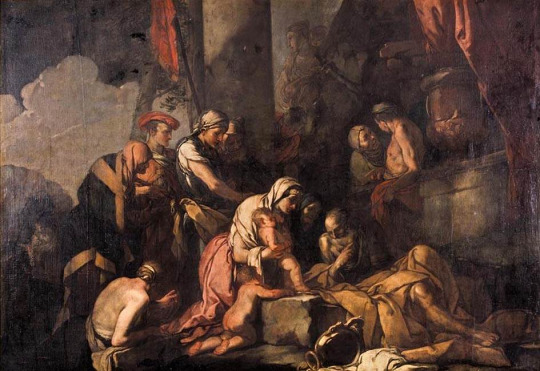
By Giulio Carpioni - Web Gallery of Art: Image Info about artwork, Public Domain, https://commons.wikimedia.org/w/index.php?curid=10618028
Liriope was 'ravaged' by Caphissus, a river god, and later gave birth to Narcissus, who was 'beautiful even as a child'. Tiresias prophesied Narcissus could only live a long life if he never 'came to know himself'. When he was 16, he went hunting with friends, and ended up separated from them and lost.
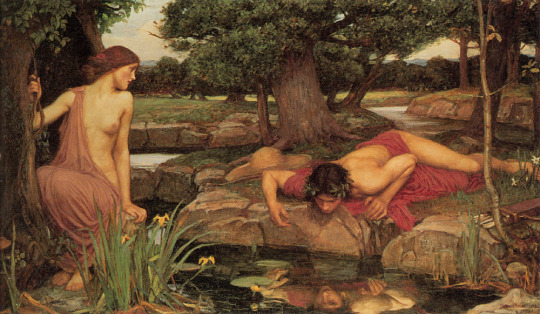
By John William Waterhouse - http://www.allartpainting.com/echo-and-narcissus-p-16444.html, Public Domain, https://commons.wikimedia.org/w/index.php?curid=7716057
Echo, a mountain nymph, was used by Zeus to keep Hera busy while Zeus catted about behind her back, or while his lovers escaped from Olympus. Hera punished her by making it so Echo could only repeat what she'd just heard. Echo saw Narcissus and became inflamed with desire and followed after him. Narcissus became aware of Echo's presence, but he couldn't see her. He called out 'Who's there?', which she called back, and so on. Echo crept closer to Narcissus, until he could see her. She tried to embrace him and he rebuffed her, telling her to 'keep her chains'. After this, Echo wasted away until only her voice remained.
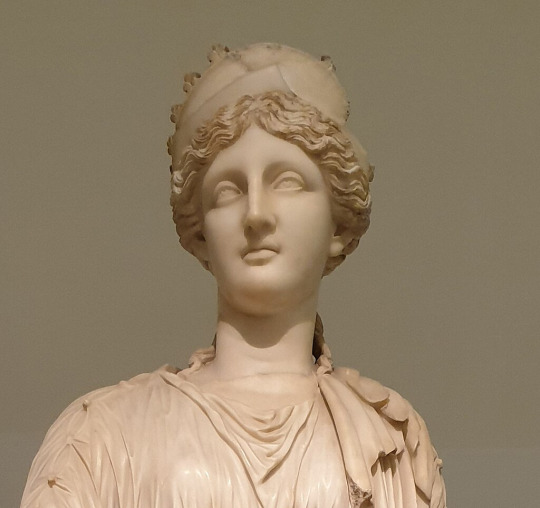
By Jamie Heath - https://www.flickr.com/photos/mumblerjamie/49345495687/in/photolist-7dQTrU-Jt9nya-6hGRqg-2ibuyGp-KnkmSu-2iUBjfG, CC BY-SA 2.0, https://commons.wikimedia.org/w/index.php?curid=138436541
Meanwhile, Nemesis, goddess of personal retribution, heard the prayers of Ameinias, a man who had also fallen in lust for Narcissus, but was likewise rebuffed. She proclaimed that Narcissus would 'never be able to be loved by the one he fell in love with.'

By Caravaggio - Self-scanned, Public Domain, https://commons.wikimedia.org/w/index.php?curid=25450745
Narcissus, wandering in the forest, becomes thirsty and approaches a pool of water that according to Ovid, no animal had ever approached. He leans down to get a drink and in the still water, he sees his reflection, one that he likens to a marble statue. He falls in love with his reflection, fulfilling both Tiresias' prophecy and Nemesis' curse in one moment. Narcissus eventually melted from the flames of his passion, becoming a gold and white flower with a bent head.
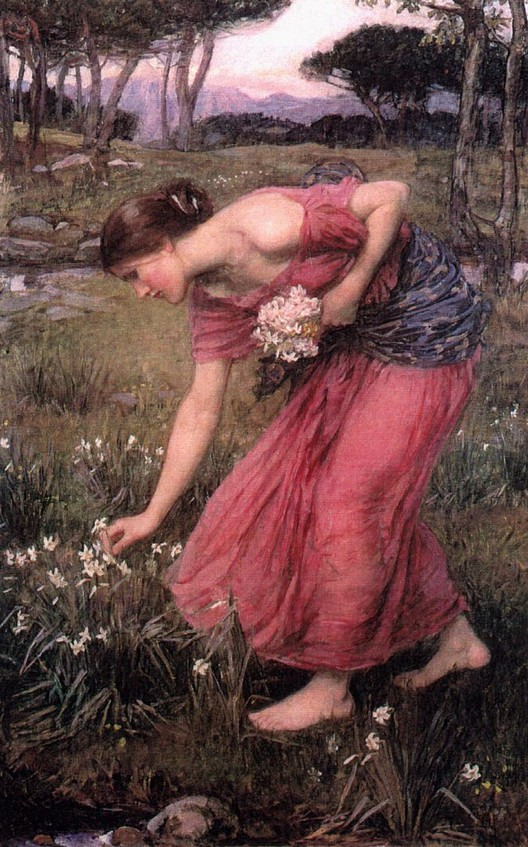
By John William Waterhouse - http://www.jwwaterhouse.com/paintings/images/waterhouse_narcissus.jpg, Public Domain, https://commons.wikimedia.org/w/index.php?curid=8034986
The second myth involves the capture of Persephone by Hades while picking narcissus flowers. Because of this, they're held sacred to Persephone and Hades and they're thought to grow along the River Styx.
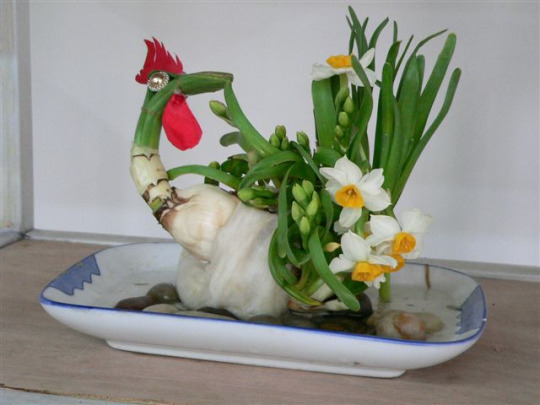
By Original uploader was 用心阁 at zh.wikipedia - Transferred from zh.wikipedia; transferred to Commons by User:Shizhao using CommonsHelper., CC BY-SA 3.0, https://commons.wikimedia.org/w/index.php?curid=12462572
Among the Chinese, narcissus is connected to the Chinese New Year and symbolizes good luck, in contrast to the association with death in many Western cultures.
5 notes
·
View notes